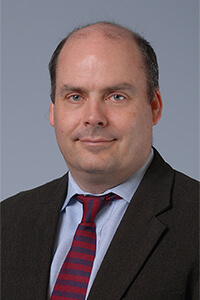
Clark D. Wells, PhD
Associate Professor of Biochemistry, Molecular Biology & Pharmacology
- Phone
- (317) 278-1060
- Address
-
635 Barnhill Drive
Medical Science, Room MS4079A
Indianapolis, IN 46202 - PubMed:
-

Bio
I received my undergraduate degree in Biology from the University of Kentucky. My Ph.D. was subsequently carried out with Dr. Paul Sternweis in the Pharmacology department at UTSW. I then trained with Dr. Tony Pawson at Mount Sinai as a post-doctoral fellow. My graduate work elaborated basic mechanisms of G-protein signaling which I then applied to understand epithelial cell polarity during my time as a post-doctoral fellow. In 2006, I accepted a tenure-track position as an Assistant Professor at the Indiana University School of Medicine. I was promoted to an associate professor with tenure in 2011-12. My work with Dr. Pawson identified that members of the Angiomotin family of proteins function as scaffolds that direct the assembly of polarity protein complexes. We also found that Angiomotin proteins strongly impacted the intracellular trafficking of these complexes to control overall cell shape. My laboratory at Indiana University has gone on to determine how Angiomotin proteins coordinate “polarity” signaling with the control of the HIPPO pathway, a master regulator of cell growth. We have mainly been studying these systems as part of an early and important mechanism to maintain mammary epithelial cell function and how its dysregulation contributes to breast tumor development.
Key Publications
For a complete list of publications, visit PubMed| Year | Degree | Institution |
|---|---|---|
| 2001 | PhD | University of Texas |
| 1993 | BS | University of Kentucky |
My laboratory is interested in the relationship of hyperplastic growth with malignant breast tumor formation. A fundamental GAP in our understanding of the natural history of breast cancer development is the lack of a molecular basis that explains how the loss of cellular differentiation underlies the desensitization of cells to the growth inhibitory influences of the microenvironment. My laboratory has found evidence that such events are strongly influenced by alterations in the signaling pathways that mediate the cross-talk between “polarity” proteins and core pathways involved in cell proliferation. In particular, we are focused on how the differential expression of the Amot family of adaptor proteins mediates the balance between growth arrested and differentiated ductal epithelia with highly proliferative and de-differentiated carcinomas. Our long term goal is to use such information to identify histologically significant markers that indicate whether normal appearing or hyperplastic tissues are likely to develop malignant carcinomas.
Desc: Trustees' Teaching Award
Scope: University
Date: 2023-05-01